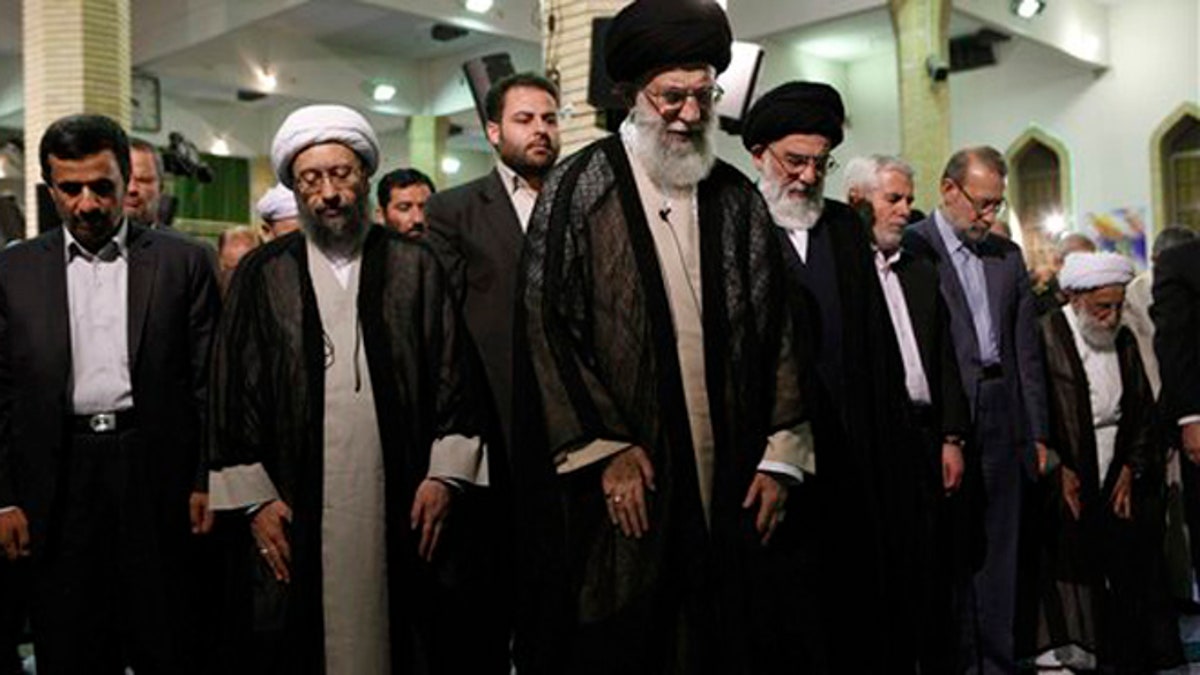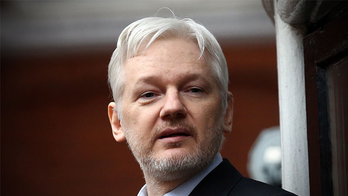
July 2012: This photo from the office of Iran supreme leader Ayatollah Ali Khamenei shows him, center, and President Mahmoud Ahmadinejad, far left, praying in Tehran. (AP)
The Senate has joined Congress in voting to slap sanctions on Iran's energy, shipping and financial industries.
The House passed the bill 421-6 on Wednesday. A short time later, the Senate approved the bill by voice vote and planned to send it to President Barack Obama for his signature.
The legislation builds on the current penalties directed at financial institutions that do business with Iran's central bank.
Lawmakers argue that increasing the economic pressure on Iran will force it to abandon its suspected nuclear weapons program.
In a rare show of bipartisanship, House and Senate negotiators compromised on the measure that would impose sanctions on anyone who mines uranium with Iran or provides insurance to the National Iranian Tanker Co., the state-run shipping line. The bill also seeks to undermine Iran's ability to repatriate revenue from the sale of crude oil.
The proposed sanctions follow ones passed last year that focused on penalizing banks that do business with Iran.
The proposed new bill expands on existing penalties and would impose sanctions on anyone who mines uranium with Iran; sells, leases or provides oil tankers to Tehran; or provides insurance to the National Iranian Tanker Co., the state-run shipping line.
The package has bipartisan support and the backing of the American Israel Public Affairs Committee.
GOP South Carolina Sen. Lindsey Graham said the support from the pro-Israel lobbying group “will go a long way.” And Sen. Bob Menendez, D-N.J., who pushed for the shipping sanctions, called the bill a good move at a critical time.
The United States and Europe argue that depriving Iran of its oil income thwarts its suspected drive for nuclear weapons. Iran has exported 2.5 million barrels of oil a day to Europe, China, India, Japan and South Korea. Officials say the penalties have reduced Iran oil exports to fewer than 1.8 million barrels a day, costing Tehran about $63 million daily.
However, others argue the existing sanctions appear to have done little to deter Iran’s quest, which draws into question whether more will help.
Israeli officials think their county is at great risk should Iran achieve nuclear capability and have hinted at a possible military strike.
Prime Minister Benjamin Netanyahu said Tuesday “the decision on Iran has not yet been made,” but the decision would be made by him and government leaders, not military generals.
Netanyahu on Sunday said world leaders must do everything in their powers to prevent the ayatollahs from possessing nuclear capability but “we have to be honest and say that all the diplomacy and sanctions ... so far have not set back the Iranian program by one iota."
Peter Brookes, of the Heritage Foundation, agreed Tuesday that sanctions so far have had little impact.
“I’m all for sanctions, but unfortunately I just don’t see progress in curbing Iran's nuclear aspirations,” said Brookes, a senior fellow for national security affairs at the conservative, Washington-based think tank. “The question is how much pressure is Iran willing to endure -- how important is the bomb to Tehran.”
Brookes also pointed out that North Korea has lived for years under sanctions, and some sanctions imposed on Iran date back to 1979.
“There’s not much left to sanction,” he said, adding the key to sanctions is to get other countries to join in them.
Traveling in the Mideast, Defense Secretary Leon Panetta acknowledged that stiff international sanctions have yet to compel Iran to give up its nuclear ambitions. But he insisted that more pressure eventually would lead Iran to "do what's right."
“While the results of that may not be obvious at the moment, the fact is that (Iranian officials) have expressed a willingness to negotiate,” Panetta said Monday.
Iran leaders have said Western-led sanctions and pressure will not force Tehran to change its policies and have expressed confidence that the country can beat the latest moves to block its vital oil and banking industries
The proposed package now on Capitol Hill would also penalize anyone who works in Iran's petroleum, petrochemical or natural gas sector, or helps Tehran's oil and gas industry by providing goods, services, technology or infrastructure.
Rep. Ileana Ros-Lehtinen, R-Fla., chairwoman of the House Foreign Affairs Committee, said the proposed bipartisan, bicameral bill “counters Iran's efforts to evade them.”
Ros-Lehtinen and Sen. Tim Johnson, D-S.D., chairman of the Senate Banking Committee, said their staffers have worked for weeks to reconcile a bill the House passed in December and one the Senate approved in May.
The Associated Press contributed to this report.




